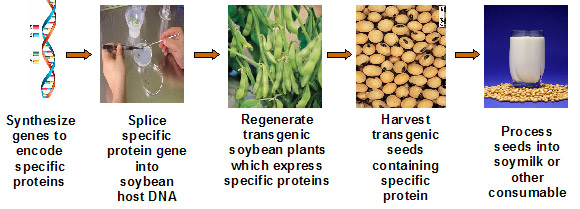Technology
The technology behind SoyMeds.
Overview
Although the expression of proteins in transgenic plants offers a cost-effective alternative for the production of pharmaceutical proteins, soybean is the only practical plant system that can be used to formulate and deliver proteins to mucosal surfaces without extensive and costly protein purification and/or concentration. Soybean seeds are one of the richest natural sources of protein (~40% protein by weight) in the world. Thus, practical levels of transgenic proteins can be achieved in seeds without the need for costly protein concentration and purification. In addition, soymilk and soy meal formulations are safe and palatable for humans and livestock. Since many products for human and livestock consumption already contain soy proteins, adverse reactions to orally administered soy formulations will not pose significant risks. Soymilk and soy meal can be processed in bulk and then assayed for transgenic protein content to ensure accurate and precise dosage. The long term stability of proteins expressed in transgenic soybeans also allows unprecedented flexibility in storage and transportability of therapeutic products. Soybean powder and soy-products could be shipped worldwide and stored indefinitely without refrigeration and without significant protein reduction. The 4-5 month growing period for soybean allows for up to three plantings a year under strict containment (e.g. USDA-approved greenhouses).
Transformation Process
SoyMeds has created a platform technology that allows for expression of a wide variety of pharmaceutical proteins in soybean seeds that can be used with or without purification to treat, prevent, cure, and diagnose a variety of diseases. Although technically challenging, the concept of a soybean-derived pharmaceutical is quite simple: Synthetic genes encoding known proteins are codon-optimized for maximal expression in soybeans, and then assembled into expression cassettes utilizing specific regulatory elements that target expression of proteins to subcellular locations within seeds. The expression cassettes are stably integrated into the soybean host genome where target proteins accumulate in seeds. Transgenic seeds are harvested, ground, and processed into either soymilk for immediate use, or soy meal which can be stored for long periods of time with minimal climate control. SoyMeds technology specifically exploits soybean as a host because soybeans are the richest natural source of protein in the world (~40% by weight). Because of this high protein content, unprecedented levels of transgenic protein can be produced and harvested from seeds.

Since the function of a soybean seed is to store protein until conditions are optimal for germination, transgenic seeds bearing pharmaceutical proteins can also be stored for extended periods of time under ambient conditions without refrigeration or climate control. Given the high protein content (40%) and expression level (1-3% of total protein) that can be achieved with seed-specific promoters, it is typical to produce >1.2mg of transgenic protein from a single seed. Simply stated, each seed represents approximately one human dose of vaccine antigen or other therapeutic treatment. This translates to 0.4-1.3 kg of transgenic protein, or >1 million doses of vaccine antigen, that can be produced in a one-tenth acre USDA-approved greenhouse from plants grown under strict containment. Transgenic seeds and the corresponding therapeutic proteins can then be processed into soy meal or soy milk and formulated for oral delivery, or purified for use in diagnostics.
.
